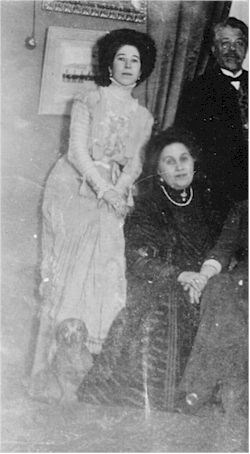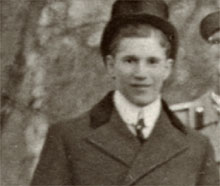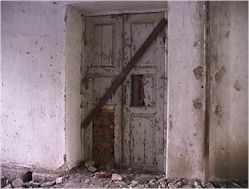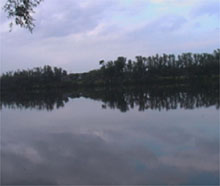|
Filmmaker's
Statement
|
 |
The desire to go
back and find family historical roots is universal. Americans in
particular long to do this because most of our ancestors came to
this land a long time ago from somewhere very far away.
In the push to assimilate, the tendency was often to focus on the new life rather than the old one. After a couple of generations the connection with the past and all its richness sank, for many, to the bottom of the melting pot.
For the millions who emigrated from Eastern Europe, the break with the past was even more profound, as their homelands fell victim to dark powers of historical change brought by two world wars and the rise of the Soviet state. Their descendants had faint hope of ever making a personal connection with their family's country of origin.
But when communism crumbled, possibilities suddenly arose for building a bridge between the new and the old. Russia signaled this unequivocally by bestowing Leningrad its original name of St. Petersburg again.
"Finding Dzhulynka" is the story of one American family's journey back "home" and the powerful meaning it brings to their lives. This 42-minute documentary follows three descendants of opera singer Vladimir Rosing as they return to Russia and
Ukraine in the emotional weeks following September 11, 2001. Like refugees in reverse, Vladimir's descendants escape from terror newly unleashed on American soil into a "new" old world where the past floats hauntingly under the surface of the present.
 Born of an aristocratic family, Vladimir Rosing left behind his sisters and parents in the revolution of 1917 and never knew what became of them. Armed with only bits and pieces of information, his American
descendants return to St. Petersburg to try and solve the 85-year-old mystery, searching for the past Vladimir left behind.
Born of an aristocratic family, Vladimir Rosing left behind his sisters and parents in the revolution of 1917 and never knew what became of them. Armed with only bits and pieces of information, his American
descendants return to St. Petersburg to try and solve the 85-year-old mystery, searching for the past Vladimir left behind.
The Rosing family owned a sizable country estate in Ukraine with manor houses in the villages of Teofilivka and Dzhulynka. The stories Vladimir told of life on these estates had been romantic and captivating. His descendants dream of finding the locations, wondering what traces might still remain.
During the Second World War there had been major battles in the area. When Vladimir had read these reports he had envisioned his beloved homes destroyed. The family's goal was to see for themselves what had become of them.
When Vladimir left Russia and could not return it was as though a part of him was torn away. That rawness undoubtedly contributed to the power of his art in later years and why his concerts advertising "The Soul of Russia" were always sellouts. As much as he loved his new adopted country of America, he never stopped grieving for the old, the people and places he left behind. For the family, returning to Russia and
Ukraine was a kind of closure by proxy. Ironically the closing of old doors allowed new ones to open.
 Vladimir experienced the power of life shaping world events. Over and over he saw his life altered by the larger forces of historical change: first by world war, then by the Russian Revolution and Civil War. Later, in America, the Great Depression hit him. He returned to England only to find World War II waiting around the corner.
Vladimir experienced the power of life shaping world events. Over and over he saw his life altered by the larger forces of historical change: first by world war, then by the Russian Revolution and Civil War. Later, in America, the Great Depression hit him. He returned to England only to find World War II waiting around the corner.
Vladimir's life is a particularly dramatic case, but we all live our lives in a historical context. World history is the context in which personal history takes place. In the film, world history is a virtual character, an antagonist against which the story of Vladimir's life is reflected.
The opportunity for the film existed only because of the fall of communism and the end of the Cold War. Before that, such a journey for Americans was unthinkable. Even in the actual time of filming, the journey of discovery takes place in the context of the horrific events of September 11, 2001. Just as Vladimir was made a refugee by the events in 1917, the events of September 11th make the family feel as though they are playing it out in reverse as they "flee" America and return to the land Vladimir longed to set foot on again.
History happens within the context of place. Place is more than a backdrop. People vanish, and events are ephemeral, but place remains. It is an imprint of the past extended into the present. Objects can be taken out of context and become anonymous, but place is the context.
 That's why returning to Russia and ultimately finding Dzhulynka brought the family so much closer to Vladimir. After experiencing a place, we can internalize it and carry that closeness with us. To be in a place and to really experience it is our only real way of touching the past. Ironically it is this element that is impossible to ever fully capture on film.
That's why returning to Russia and ultimately finding Dzhulynka brought the family so much closer to Vladimir. After experiencing a place, we can internalize it and carry that closeness with us. To be in a place and to really experience it is our only real way of touching the past. Ironically it is this element that is impossible to ever fully capture on film.
The final theme of the film is survival. Vladimir survived the Russian Revolution, prospered in the West and produced a line of descendants. Russia and America, and their citizens, survived the perilous Cold War. Millions grew up in the bleak consciousness of knowing that their world could all end in minutes, and now they are thankful -- if not wary -- survivors. And Russia survived communism, perhaps the most invasive social experiment in the history of mankind.
Lastly, the film's miracle is that a place like the Rosing estate survived while so many burned. Set against a backdrop of loss -- America's loss of innocence in the wake of September 11th, the loss of a father, the loss of a homeland, and the loss of a way of life for generations -- the miracle is in what is found.
The message then is of hope, that somehow we can make it through the darkest of times, and that if we cannot find the miracle ourselves then someday our children may stumble upon it and recognize it as their own.
-- Richard Rosing,
July 2004